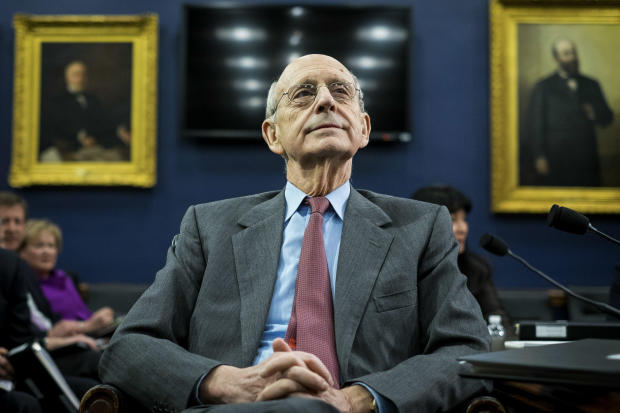Democrats' takeover of Washington prompts questions about Justice Stephen Breyer's future
Washington — Justice Stephen Breyer's future on the Supreme Court has become the subject of whispers in Washington, now that Democrats control the White House and Congress, and the window for President Joe Biden to appoint a successor could be narrow, given the Senate's razor-thin majority.
At 82 years old, Breyer is the most senior member of the court's three-member liberal bloc, having served on the Supreme Court for more than 25 years. While Breyer remains active during oral arguments, questions have arisen as to whether he should step down from the Supreme Court to allow Mr. Biden to fill his seat with a successor who could serve for decades.
"Ultimately, the decision of whether or not to retire will be up to Justice Breyer. Who am I to say?" Chris Kang, chief counsel of the progressive group Demand Justice, told CBS News. "But I do think that as Justice Breyer sort of considers his legacy and considers the right time, one of the factors that often goes into a justice's retirement is control of the White House. Given the precedent that Mitch McConnell set in 2016, control of the Senate is likely a consideration as well. With Democrats in control of the White House and the Senate, if that's something that goes into Justice Breyer's consideration, I think this would be the right time to retire."
While a Democrat winning the presidency may have factored into a decision by any of the justices in the court's liberal wing to step down, the outcome of Georgia's two runoff elections this month has added urgency to any decision.
Democrats Jon Ossoff and Raphael Warnock defeated incumbent GOP Senators David Perdue and Kelly Loeffler, respectively, leaving a 50-50 split in the Senate. But Vice President Kamala Harris would cast any tie-breaking vote, putting Democrats in control of the upper chamber.
"With a Democrat-controlled Senate and the majority so slim, you never know what's going to happen," Kang said. "That is what changes the calculus and the stakes and the immediacy around deciding when to retire."
Bakari Sellers, a former Democratic state lawmaker from South Carolina, tweeted earlier this month that if Democrats' won both of Georgia's Senate seats, "I need Justice Breyer to announce retirement at 12:01pm on January 20th."
The fragility of Democrats' majority was on display Tuesday, when Senator Patrick Leahy of Vermont, the longest-serving Democrat, was briefly hospitalized on the recommendation of the Capitol attending physician, after he swore in senators for former President Donald Trump's impeachment trial. Leahy was back on Capitol Hill on Wednesday to open the Senate session and told reporters he had experienced muscle spasms. Doctors gave him a "clean bill of health," he said.
Mr. Biden has vowed to nominate the first Black woman to the Supreme Court if a vacancy were to arise, and Kang said Breyer could pave the way for that historic nomination and ensure more diversity on the nation's highest court by retiring.
The political landscape in Washington is reminiscent of President Barack Obama's first term in office, when Democrats held the Senate majority. Then, the late Justice Ruth Bader Ginsburg faced pressure to retire from the Supreme Court and allow Mr. Obama to name a liberal successor who could be on the bench for decades.
But Ginsburg resisted and served until her death in September, when Mr. Trump was in office and Republicans controlled the Senate. Just weeks before the 2020 presidential election, Mr. Trump nominated Amy Coney Barrett, a conservative jurist, to fill Ginsburg's seat, and the GOP-controlled Senate speedily confirmed her to the Supreme Court just before Election Day.
Barrett's appointment further solidified the high court's 6-3 conservative majority, raising concerns from Democrats that Ginsburg's legacy on the court could be in jeopardy. In addition to Barrett, Mr. Trump named Justices Neil Gorsuch and Brett Kavanaugh to the high court.
But Nan Aron, president of the Alliance for Justice, a progressive judicial group, said Ginsburg's experience should be viewed as a cautionary tale, as public pressure for her to retire backfired.
"Rather than be pressuring Stephen Breyer to step down, my preference would be for Clarence Thomas and Samuel Alito to exit as quickly as possible," Aron said. "That wouldn't tip the balance, but it would certainly bring the court a bit more in balance than it currently is with a supermajority of ultra-conservatives."
But there is essentially no chance of Thomas or Alito leaving the court while Mr. Biden is in the White House, barring an unforeseen event.
Breyer, more so than his colleagues, has had a front-row seat to the politics of the Supreme Court nominations process, having been not only a nominee but also special counsel and chief counsel to the Senate Judiciary Committee.
Aron said that because of that background, he knows the political landscape in the country and the Senate, and how that relates to the makeup of the Supreme Court. Breyer "must be acknowledging that there is an opportunity to help the Biden administration put on a younger jurist" in his mold, she said.
Kang, however, said it's not difficult to grasp the possible political consequences of waiting to leave the bench.
"The stakes for this and the way Republicans have politicized the Supreme Court are incredibly clear," he said. "Perhaps he has a unique perspective, but I don't think it's necessary to understand the dynamics at play."
Breyer has not indicated how long he plans to remain on the Supreme Court, though in 2019 he suggested 18-year term limits for Supreme Court justices, as he "wouldn't have to worry about when I'm going to retire or not." In December, he told Slate, "eventually I'll retire, sure I will. And it's hard to know exactly when."




